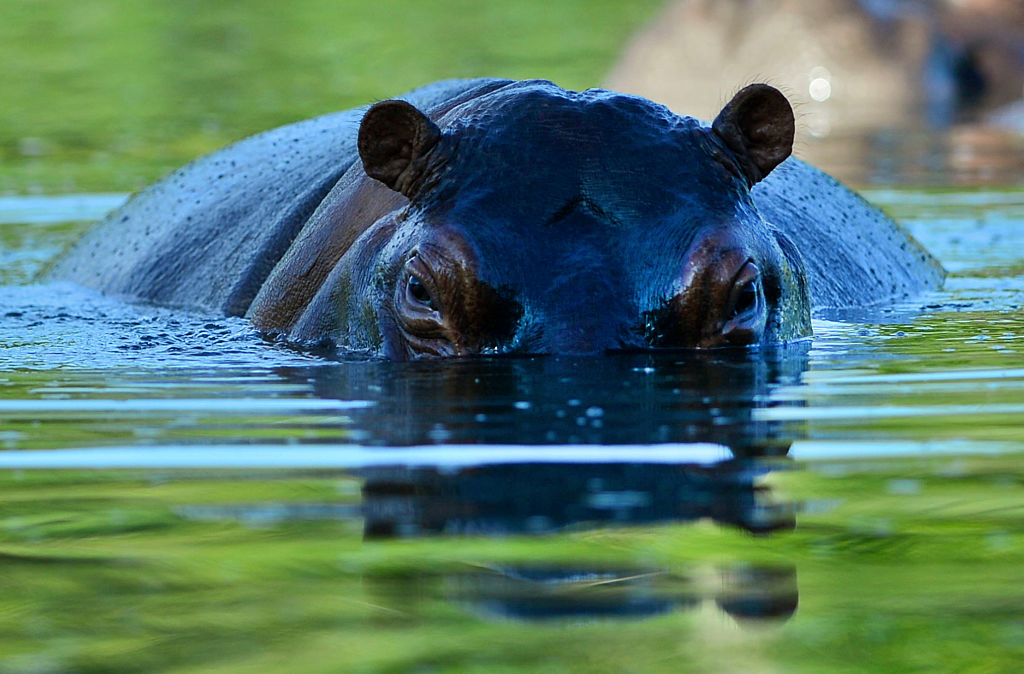When I first heard the expression ‘cocaine hippo,’ my initial thoughts were that it must either be a reference to some sort of industrial scale drug mule operation, or that someone was being rude about Mitch McConnell. In fact, the origins of the cocaine hippo aren’t far from the former, but are even more outlandish than you might expect.
In the 1980s, when he wasn’t becoming the world’s richest drug kingpin or going to war with the government, Pablo Escobar indulged his various passions: he bought a football team, grew Colombia’s most lustrous moustache (no mean feat in those days) and opened a private zoo on his estate outside Medellin, Hacienda Napoles. There, he imported rare and exotic species for the entertainment of his young children, including zebras, giraffes and elephants.
Denying feral hippos their right to procreate is not straightforward, though, nor something to which they are particularly accommodating.
You might think it strange for someone to spend their money on something so impractical, but Escobar had more money than he could spend. Besides, part time zoology is nothing new to high-status men with dark sides and god complexes.
Like much of his menagerie, Escobar was himself something of an endangered species, and when he went the way endangered species tend to, his animals were repossessed by the authorities, and taken to other, more reputable zoos and sanctuaries. All, that is, except the hippos. The four hippopotamuses Escobar had imported posed a problem; they weren’t quite endangered enough to make relocation a priority, and were sufficiently large and aggressive enough to make moving them off-putting. So instead, they were abandoned, and left to roam free; Hacienda Napoles’ very own Bourbons.
That was in 1993, and since then, the hippos (three females and a male) have been busy. Not content with their small kingdom, they have done what hippos do — seeking out sustenance, going forth and multiplying. And multiplying. And multiplying. Now there are more than 80 of them, and they have colonised several nearby rivers and lakes. Some might say ‘good for them’; they had an inauspicious start, all things considered, and aren’t exactly up there among Colombia’s biggest threats, being neither a paramilitary group nor, despite their name, a drug cartel (though given the rate of their territorial expansion, let’s not rule anything out). If they were left to their own devices, why shouldn’t they make a new life for themselves? That is the attitude of many locals, too, who have come to see the hippos as a curiosity to be proud of — and a story other than drugs, corruption or violence. The magic realism literary genre is, after all, a product of Colombia; after decades of strife, a few hippos lurking in the country’s ponds and river bends makes for a pretty fantastical story.
But the Colombian government sees things differently. Having initially done little to stop the march of the cocaine hippos (much like its initial approach to the cocaine trade) it has, belatedly, decided that the threat they pose needs to be addressed. Several attempts have been made to reduce their numbers in the past, by catching them and sterilising them. Denying feral hippos their right to procreate is not straightforward, though, nor something to which they are particularly accommodating.
The authorities fear that unless they are now culled, their numbers could swell to five hundred or more, at which point, they will stop being quaint, lumbering ecological anomalies, and begin to be a serious danger. As it is, they are disrupting the countryside and outcompeting local wildlife for resources, and, naturally, have begun to encroach on human settlements, stealing crops and injuring several people.
Elsewhere, hippo numbers are declining, so it’s created a bit of ecological quandary – do Colombians let the hippos breed or wrestle back control of the situation? For the time being, at least, it seems that Escobar’s chequered legacy lives on – albeit in a bizarre fashion.






Comments